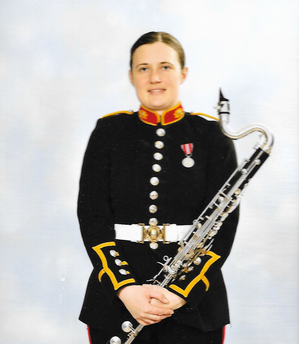
Kate Wheway spent 14 years in the Royal Marines from 2005-2019 as a Musician, playing two instruments, where she performed around the UK and globally, ranging from ceremonial duties as a military band on parade, concert band, orchestra and string quartet. Kate’s secondary role was as a battlefield medic where she carried out activities such as stretcher bearer, ambulance driver; training in decontamination for any nuclear, biological or chemical attack.
A typical concert day for Kate would be a long one; commencing at noon with the loading of their ‘gear’ into the wagon, then travelling to the concert venue which would be an average of 3 hours away by coach. Once at the venue and setup, a sound check and rehearsal before dinner and an hour to relax before concert start at 1930, finishing at 2215, de-rig of the stage and arriving home at around 0200. Dependent on how busy they were, it was often known for them to be back in work for 0530 to then travel for 7 hours to Hull to follow the same routine, travelling back at the end of the concert, to return to Scotland at 0530 – all dependent on their scheduled bookings.
Kate’s core skills she gained whilst serving are:
Kate secured her current role as Graduate Quantity Surveyor for Robertson Partnership Homes by using her Enhanced Learning Credits to complete a Postgraduate in Commercial Management and Quantity Surveying with Heriot-Watt University whilst working full time in the Forces, under a distance learning scheme. The whole process took 4 years. Kate had a clear idea and a goal of what she wanted to do which meant her transition to “civvy street” went fairly smoothly. She had a 5-year plan to complete her studies, using her free time to obtain work experience locally to get a feel for the role which also gave her a further understanding for her exams. Kate had planned to join the consultancy where she had undertaken her work experience but due to Brexit, they were unable to offer her a position. It was during her induction with BuildForce when she was asked if she had considered the Contractor QS role, (she hadn’t) which lead her to an interview with Balfour Beatty, followed by a secured Graduate QS position at Robertson’s all in place by the time she was sitting her CTP workshop. Kate would have liked to have seen more of a focus on managerial roles into the construction sector during her resettlement similar to what is offered to those interested in the health and safety route. As a musician/marine, due to not being able to progress up through the ranks,
Kate feels she may not have been seen as someone who had leadership experience and if it wasn’t for her specific studying she thinks she wouldn’t have been considered for a managerial role.
Kate’s role beginning as a Graduate, meant assisting the Senior QS in administrative roles and sitting in meetings to gain experience. However, due to a recent resignation, she is now project lead on a small site. Rather than a ‘typical’ day, Kate’s time is split into ‘typical’ weeks:
Key skills such as communication, integrity, resilience, self-motivation and drive, time management, adapting to the live situation and performing to the best of your ability are all transferable skills Kate has gained during her military career and is now applying them daily to her role as a QS.
When asked what advice Kate would give to someone looking to transition from the Armed Forces to a career in construction, she replied:
“It’s a refreshing change from the mob, but there are some similarities. Every day is different in the construction industry, sometimes you will have a plan for the day, but you can easily be side-tracked by something your boss asks you for that they needed yesterday. It’s a
challenging industry, but if that’s what you are looking for then it will suit you well. If you want to progress, there are many opportunities, you have to grasp them with both hands. If you work on site, those you work with are your family for the next 1-2 years.”
And the three words, Kate would use to describe the construction sector: “challenging, rewarding and opportunistic,” followed by “dedicated, resilient and adaptable” to describe an ex-military person to a construction employer.